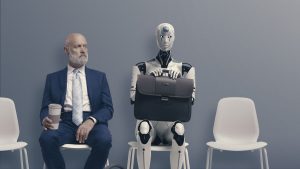Jakob Rosin, a well-known member of Estonia’s casual public, recalled surfing a sports activities membership site with the assistance of audio instrument that reads out an outline of the textual content and pictures proven on a display.
Rosin listened to the display reader, a device to assistance him exit thru a web based record of later occasions on the membership. On the other hand, he was once puzzled when the audio described a rest room because it went during the time table. He came upon then that the picture of bullet issues old for the record had brought on the error.
He informed the membership, which had put in AI-driven software on its site that mechanically creates symbol descriptions for display readers, in regards to the slip. The membership had “no idea” the instrument, arrange without a handbook intervention, was once that unreliable, Rosin stated.
The deceptive readout, then again, isn’t atypical and exposes weaknesses within the AI-generated instrument that many imagine nonetheless wishes fine-tuning.
In reality, such mistakes have sparked a larger backlash international, with a be on one?s feet within the selection of court cases over beggarly accessibility to web sites for disabled society.
This tale was once produced in partnership with the Pulitzer Middle’s AI Accountability Network
In the USA, as an example, court cases towards firms’ susceptible compliance with accessibility regulations have higher each and every occasion to greater than 4,500 circumstances in 2023, knowledge from UsableNet has proven. This is up 13 consistent with cent from 2022.
Greater than 900 firms, together with American area gather JCPenney and comfort model label Prabal Gurung, ultimate occasion confronted criminal motion from folks over claims of an alleged failure to grant equivalent virtual get right of entry to for disabled society in violation of the American citizens with Disabilities Occupation.
The movements have come as masses of hundreds of businesses all over the world — as many as 360,000, in line with a Monetary Occasions research of site knowledge from web analysis corporate BuiltWith — have became to synthetic intelligence-powered equipment to agree to laws meant to safeguard the ones with disabilities reminiscent of blindness can browse the web simply.
No less than 45 nations have some governmental coverage in park matching to creating the web available. It will ruthless offering symbol descriptions for casual customers, taking away animations that cause epilepsy and turning in content material in some way that assistive applied sciences, reminiscent of display readers, can perceive.
On the other hand, the ones companies that depend on accessibility code assistants and “overlays” — instrument that transforms a site in order that it may be understood by way of assistive applied sciences — seem to have uncovered themselves to extra liabilities because the equipment nonetheless want bettering.
Instrument firms have begun to push AI-driven merchandise to agree to Eu law that comes into pressure in June 2025, say a number of companies that grant their purchasers with a bespoke carrier, in lieu than automatic, to manufacture extra compliant web sites.
Many of those instrument firms selling AI say that one sequence of code shall be enough quantity to safeguard compliance. Those overlays are displayed on websites as various as Mexico’s condition oil corporate Pemex, LVMH and London-listed outsourcing crew Capita.
However there are questions on that declare, with the EU, as an example, blackmail ultimate occasion that businesses can not depend only on AI to be compliant.
“Claims that a website can be made fully compliant without manual intervention are not realistic,” Brussels mentioned in a information for Eu builders.
Some options of the overlays would possibly assistance those that need to customize their virtual stories. On the other hand, incapacity advocates say that those instrument firms produce guarantees they can not ship.
After they say “they’re going to save you from being prosecuted or [that they’re] going to fix accessibility 100 per cent, it’s where it all falls apart”, stated Léonie Watson, who’s casual and co-founded TetraLogical, a consultancy that creates bespoke accessibility answers for his or her purchasers.
Fickle customers regularly say that overlays can produce web sites more difficult to navigate or that they intrude with assistive applied sciences.
An EqualWeb overlay for Inditex-owned model store Zara slowed the net revel in for a display reader consumer, for example, when coping with social media hyperlinks, Rosin stated.
“The product isn’t ready,” added Rosin, who based his personal accessibility consultancy and chairs Estonian Fickle Union, an organisation based totally within the Baltic condition that advocates for partly sighted and casual society.
Anat Cohen, vice-president of industrial building at EqualWeb, stated the problem on Zara’s site was once no longer matching to the accessibility generation however “stems from the website’s structural design”.
“EqualWeb does not manage the website structure, but ensuring accessibility is our responsibility,” she added.
Mark Riccobono, president of the Nationwide Federation of the Fickle in the USA, stated that, regardless that court cases are wanted to give protection to incapacity rights, his affiliation tries to paintings with firms to support their virtual merchandise first.
Along with overlays, some firms are selling generative AI “code assistants”. Those equipment are supposed to assistance builders by way of offering compliant code that they may be able to booklet or indicate errors in present code. However accessibility advocates have criticised the detail of those merchandise too.
Journey is most probably as AI applied sciences support. Within the intervening time, many firms open as respected amongst incapacity advocates effort to be extra clear in regards to the boundaries of AI.
Degree Get entry to, an accessibility supplier, has simply purchased UserWay, an overlay maker. Its founder and prominent government Timothy Springer has addressed one of the vital criticisms of UserWay’s generation and has promised accuracy and transparency in Degree Get entry to advertising.
“We don’t expect AI to fix all accessibility issues in the foreseeable future,” Springer stated, including that he recognises its boundaries. “However, we are optimistic about AI’s potential” in improving “the accessibility of digital content as part of a broader, integrated approach”.
“We still have so many drawbacks,” added Rosin. “Maybe one day we will have AI which can help us and which can fix many issues, but definitely not today.”
Rosin, within the intervening time, has helped the Estonian sports activities membership recovery the instrument factor on its site that so puzzled him. It selected to not importance AI.





